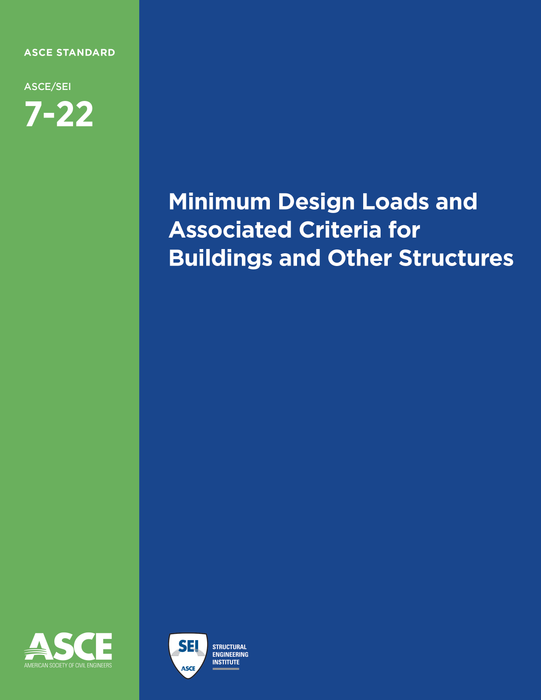
ASCE 7-22 Minimum Design Loads and Associated Criteria for Buildings and Other Structures
Prepared by the Minimum Design Loads and Associated Criteria for Buildings and Other Structures Standards Committee of the Codes and Standards Activity Division of the Structural Engineering Institute of ASCE.
Minimum Design Loads and Associated Criteria for Buildings and Other Structures, ASCE/SEI 7-22, provides the most up-to-date and coordinated loading provisions for general structural design. This standard prescribes design loads for all hazards including dead, live, soil, flood, tsunami, snow, rain, atmospheric ice, seismic, wind, and fire, as well as how to evaluate load combinations. The 2022 edition of ASCE 7, which supersedes ASCE 7-16, coordinates with the most current structural material standards including those from ACI, AISC, AISI, AWC, and TMS.
Significant technical changes include the following: new target reliability tables for tsunami and extraordinary loads; new alternative method for loads from water in soil; terminology change from guardrail system to guard system; new provisions for emergency vehicle loads; updated tsunami data for Hawaii and many populous locations in California, coordinated with the state agencies; new tsunami provisions for above-ground horizontal pipelines; revised ground snow loads to reflect more recent snow load data and reliability-targeted values; revised method for estimating drifts to include a wind parameter; design rain load revisions to explicitly consider a ponding head; new risk-targeted atmospheric ice load data for the continental United States and Alaska; multi-period response spectrum data that eliminates need for Fa and Fv coefficients; new lateral force resisting systems such as steel and concrete coupled composite plate shear walls, reinforced concrete ductile coupled shear walls, cross-laminated timber shear walls, and concrete tabletop structures; new provisions for rigid wall, flexible diaphragm buildings (big box stores/warehouses); new and updated provisions for supported and interconnected (coupled) nonbuilding structures; new wind provisions for MWFRS and C&C of elevated buildings; new chapter of tornado provisions; new long return period hazard maps for wind and tornado.
In addition to the technical changes, the 2022 edition of ASCE 7 provisions are accompanied by detailed commentary with explanatory and supplementary information developed to assist users of the standard, including design practitioners, building code committees, and regulatory authorities.
Standard ASCE/SEI 7 is an integral part of building codes in the United States and around the globe, and is adopted by reference into the International Building Code, International Existing Building Code, International Residential Code, and NFPA 5000 Building Construction and Safety Code. Structural engineers, architects, and those engaged in preparing and administering local building codes will find the structural load requirements essential to their practice.
